U.S. Africa Command conducted its first airstrike in Libya this year in an effort to dismantle violent extremist activity in the region, amid signs of increased recruitment and other activity, according to the command.
The strike, conducted Thursday, targeted the Islamic State’s Libya faction near Murzuq, Libya and resulted in eight jihadi casualties. According to AFRICOM Commander Gen. Stephen Townsend, the strike was designed to “eliminate terrorist leaders and fighters and to disrupt terrorist activity.”
“We will not allow them to use the current conflict in Libya as protection,” Townsend said in an AFRICOM statement. “Together with our Libyan partners, we will continue to deny terrorists safe haven in Libya.”
The strike comes amid concerns from AFRICOM that Libya’s eight-year civil war could serve as a breeding ground for violent extremist organizations. In 2018, ISIS-Libya claimed responsibility for more than a dozen attacks against the Libyan government and oil infrastructure, the command said.
AFRICOM spokesman Air Force Col. Chris Karns told the Military Times in August that the unrest in Libya could provide “oxygen” to existing terrorist elements because the discord could provide terrorist groups opportunities to recruit and conduct basic training. A total of six airstrikes were conducted last year, and seven in 2017. The number was a significant reduction from the nearly 500 air strikes conducted in 2016. Today, there are fewer than 300 members of ISIS-L, Karns said.
RELATED

Even so, he said at the time no airstrikes had been conducted in 2019 because the extremist threat was “considerably degraded” before tensions in Libya intensified earlier this year.
But signs of active recruitment and training prompted AFRICOM to conduct Thursday’s strike, Karns told the Military Times in an email Friday.
“It is important to ensure the terror elements do not use the ongoing conflict in Libya to regenerate or increase in strength,” Karns told the Military Times Friday. “There was evidence reflecting active recruitment, training, and growth.”
Karns added that the violent extremist organizations in the region “represent security wildcards” and will negatively impact the stability of the region — should threats go unaddressed.
“The airstrike reflects a continued effort to ensure these elements do not pose a threat to African countries and U.S. interests,” Karns said. “Terrorist groups should not think that the current conflict in Libya offers them an opportunity to operate freely or provide sanctuary. A safe and stable Libya is in everyone’s interest as political work is pursued to de-escalate the conflict.”
He also noted that Townsend has conducted a series of assessments in Africa with countries who also want to combat terrorist activity. Most recently, Townsend visited Niger, Burkina Faso and Mali this week.
Starting in 2011, U.S. has had a small number of troops in Libya following dictator Moammar Gadhafi’s ouster. U.S. troops had been tasked with quashing Islamic State and al-Qaida-linked militants conducting attacks and recruitment.
But U.S. forces were pulled in April in response to increased unrest after Field Marshal Khalifa Hifter’s Libyan National Army launched an offensive against the U.S. and United Nation-backed government in Tripoli.
Hifter is a former CIA asset who was exiled during Gadafi’s leadership and obtained U.S. citizenship in the 1990s when he lived in Langley, Virginia. He returned to Libya in 2011.
AFRICOM and the United Nations has stressed the importance of reaching a political solution to stabilize the region.
According to Karns, U.S. troops have not returned to Libya since they were withdrawn in April.





